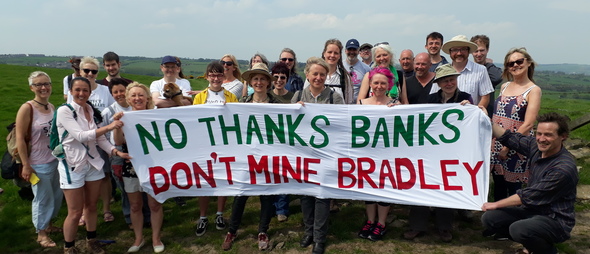In a region full of natural wonder, an energy and property development firm is trying to build a coal mine. In 2018. Natalie Bennett reports.

This morning, two local residents in the Pont Valley, County Durham, took a strong step to protect their community and landscape.
Beside a busy road, they chained themselves in front of a gate of a construction site.
Many will be astonished to know what’s trying to be built at Dipton – a new open cut coal mine. Yes, in 2018.
But the Pont Valley Protection Group is trying to stop it.
When I visited recently, it was while climate talks were going on in Bonn towards establishing the “Paris rulebook” – the path forward to slashing the world’s carbon emissions. Britain, a country which in 2008 with the Climate Change Act was a world leader in addressing climate change issues, could be about to see a new open cut coal mine opening a decade later. At a time when fossil fuel generation of electricity is fast disappearing.
On their side is a deadline – June 3, by which the Banks Group has to have finished work on an access road and on site, for the planning permission, granted years ago, to continue.
When I visited the protection camp and residents, I found multiple reasons – environmental, economic and social – why this development should not be going ahead.
This is an area, its communities, have struggled enormously against the odds since Margaret Thatcher’s destruction of coal mining in Britain. But as one local resident said to me, “we’re just really getting going again.”
That’s development built on a different kind of economy – industries that rely on and expect clean air, including tourism, cycling, walking, running. It’s also drawing on the rich history of the area: a wagonway that was used to haul coal on its way to Newcastle and then London runs through, and ponds that were once used to cool the wagon wheels are now home to newts, including the great crested newt. (One of which was found on the site recently by a protector, even though the developer denies their existence.)
Then there’s the more direct impact on people’s lives. The old mining settlement of High Stables, a tight-knit, supportive community, is only 300 metres from the site, on the path of the prevailing wind. The planning application was approved on the basis that there was a shield of a small commercial forest, which would also protect the nearby village of Dipton, and its primary school.
Much of that forest has recently been cut down. There’ll be regular blasting at the mine, Monday-Saturday. And of course, dust.
And there’s the local environmental cost. I’ve been thinking a lot lately about biodiversity and bio-abundance – the sheer bulk of wildlife and flora that we’ve lost, trashing the environment that we all depend on to live. I saw at least six skylarks and a curlew over the proposed site. Locals, including one expert whose family history includes generations of gamekeepers, told me of the raptors, the slow worms, the badgers and foxes that frequent the site.
Part of it is meadow (a tremendously rare resource in the UK as 97% has been lost since the Second World War), part semi-improved pasture that still keep many of the meadow species. That includes native grasses like sweet vernal, sedges, and wildflowers, like the wonderfully delicate purple Teasdale violet. There are also colonies of regionally important butterflies, like the small pearl-bordered fritillary and dingy skipper.
There are hedges and gappy hedges dating back to the 1780s, when this land was enclosed, stolen from the people who again faced losing this crucial national resource. They are now wonderfully twisted hawthorns that have taken centuries to form their fantastical shapes, yet could be lost in minutes to the bulldozer’s blade.
Much of England once looked like this – and had the moths and butterflies, the vertebrate wildlife and the diverse human food resources to go with it. This is now a rare survival.
The developers will say that the land will eventually be restored to pasture – but nothing at all like this. What’s here in the Pont Valley is rare and literally irreplaceable. That’s true of the human community, and the wildlife one.
We’ve been through a long era of accelerating destruction – of our communities, of our environment. It has to stop. Fast. If you can lend your support, physical or financial, to the protectors and the Pont Valley community,
please do so.
Natalie Bennett is the former leader of the Green Party. She tweets here.
Left Foot Forward doesn't have the backing of big business or billionaires. We rely on the kind and generous support of ordinary people like you.
You can support hard-hitting journalism that holds the right to account, provides a forum for debate among progressives, and covers the stories the rest of the media ignore. Donate today.



